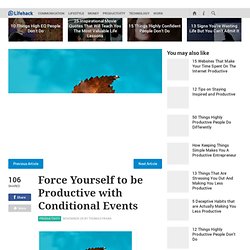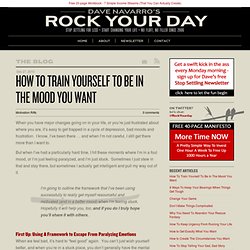

Willpower is Just a State of Mind. By Traci Pedersen Associate News Editor Reviewed by John M.

Grohol, Psy.D. on October 26, 2010 Challenging the long-held theory that willpower is a limited resource, a new study by Stanford psychologists shows that it is actually a person’s beliefs about willpower that determines his mental stamina. Up until now, many researchers have asserted that the only way to stay focused during projects that require intense concentration is to seek occasional restoration with physical distractions such as food, rest, or other activity. They believe this will help a person feel recharged and get back on task. Apparently, this isn’t the case, says the Stanford research team. “If you think of willpower as something that’s biologically limited, you’re more likely to be tired when you perform a difficult task,” said Veronika Job, lead author of the paper and postdoctoral scholar at the University of Zurich.
“But if you think of willpower as something that is not easily depleted, you can go on and on.” Force Yourself to be Productive with Conditional Events. I’ll be the first to admit it; doing stuff is difficult.

By “stuff”, I don’t mean eating, or playing video games, or doing easy things – nope, I’m talking about the things in life we decide we’ll do because they’re good for us or will help us improve. Every day, I find things that I’d like to in order to live a better life, such as doing a certain exercise every day, drinking enough water, or writing morning pages. These are all things that I know will make me feel better or learn more. So why are they so friggin’ hard to do consistently? My theory as to why these things are hard stems from Isaac Newton’s first law of motion: a body at rest tends to stay at rest. Still, we all have goals and know we could be doing more to reach them. Today I’m going to detail a technique I use to make myself do the things I know are necessary for reaching my goals. So, What Are Conditional Events? The way I think of conditional events is in the context of computer programming. How To Train Yourself To Be In The Mood You Want.
Dec 27, 2010 When you have major changes going on in your life, or you’re just frustrated about where you are, it’s easy to get trapped in a cycle of depression, bad moods and frustration.

I know, I’ve been there … and when I’m not careful, I still get there more than I want to. But when I’ve had a particularly hard time, I hit these moments where I’m in a foul mood, or I’m just feeling paralyzed, and I’m just stuck. Sometimes I just stew in that and stay there, but sometimes I actually get intelligent and pull my way out of it. I’m going to outline the framework that I’ve been using successfully to really get myself resourceful and motivated (and in a better mood) when I’m feeling stuck. First Up: Using A Framework to Escape From Paralyzing Emotions When we feel bad, it’s hard to “feel good” again. The reason for this is that steps take the emotion out of our situation and give us direction to simply act.
A: AGREE With Yourself That You Don’t Want To Be In This Mood Right Now. Dave.